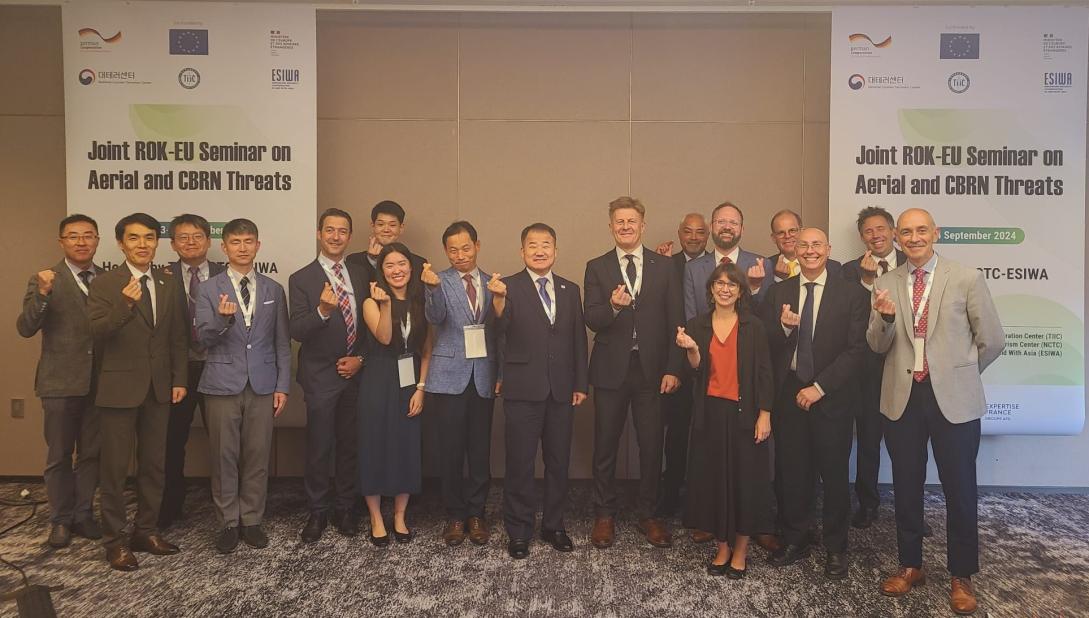CBRN preparedness, countering drone terrorism in focus in joint EU-Republic of Korea seminar

Seoul, Republic of Korea, 5th September 2024 – The Republic of Korea (RoK) and the European Union (EU) have concluded a successful two-day seminar aimed at strengthening mutual security cooperation.
The seminar was organised by the National Counter Terrorism Center (NCTC) and the EU project ESIWA (Enhancing Security Cooperation In and With Asia), focusing on enhancing preparedness for chemical, biological, radiological, and nuclear (CBRN) incidents and optimising the use of unmanned aerial systems (UAS) in counter-terrorism and security operations.
The seminar aimed to enhance counter-terrorism dialogues and partnerships in the region, consistent with the EU's Indo-Pacific Strategy, which foresees a deeper and stronger engagement with partners which share common goals and face common challenges.
Fredrik Ekfeldt, Chargé d’affaires ad interim, Delegation of the European Union to the Republic of Korea, said: "This seminar marks a significant step forward in our collective efforts to address evolving joint security challenges. By sharing our knowledge and expertise, the Republic of Korea and the European Union are better equipped to safeguard our societies."
Shin Sangkyun, Administrator, National Counter Terrorism Center, said: "The collaboration between the RoK and the EU in this seminar has been invaluable. We have not only taken a further step to strengthening our partnership but also enhanced each other’s understanding to respond to the complex threats that we face today. It is another step on a long road to a more comprehensive and global security response to an increasing global phenomenon.”
“Going forward, we will continue to strengthen cooperation between Korea and the EU by regularizing various types of cooperation," Mr Shin added.
Representing the RoK at the seminar were officials from the NCTC, the National Intelligence Service (TIIC), the Ministry of National Defense, the National Police Agency, the Ministry of Foreign Affairs, the Ministry of Environment, the National Fire Agency, the Korea Disease Control and Prevention Agency, the Nuclear Safety and Security Commission, the Armed Forces Chemical, Biological and Radiological Defense Command, and the Agency for Defense Development.
Over the course of the seminar, experts from the RoK and the EU exchanged best practices, drawing on their extensive experience in managing and mitigating complex security threats. The discussions centered on integrating UAS and Counter-UAS technologies into counter-terrorism operations and improving the stages of CBRN incident response, including prevention, containment, and recovery.
On the second day of the seminar, participants visited the RoK Agency for Defense Development in Daejeon. During this study mission, experts from EU Member States and members from the EU Delegation gained further practical insights on cutting-edge CBRN and UAS developments in the Republic of Korea.
Key Outcomes:
- Enhanced Counter-Terrorism Preparedness:
- Participants shared insights on the counterterrorism frameworks of the EU and RoK, contributing to a better understanding of counterterrorism strategies and standard operating procedures.
- Lessons learned from past incidents were shared to improve current protocols and operational readiness as well as collaboration.
- Improved CBRN Preparedness:
- The seminar emphasised a comprehensive approach to CBRN preparedness, focusing on risk assessment, emergency response, and post-incident recovery.
- Strategies of the EU, Member States and RoK were discussed to showcase coordinated responses to potential CBRN threats in the respective regions.
- Optimised UAS Utilisation:
- Advanced UAS and Counter-UAS technologies were explored, highlighting their role in enhancing surveillance capabilities and addressing aerial threats.
- Regulatory frameworks were discussed to ensure the safe and effective deployment of C-UAS in various security scenarios.
- Collaboration:
- Various opportunities for further collaboration were identified, including:
- Further collaboration between the NCTC and ESIWA in the future.
- Compare and further align policies and strategies for coordinated responses to shared security challenges, focusing on terrorism and CBRN and aerial threats.
- Further discussion to follow on joint training efforts between EU and RoK in 2025.
- Various opportunities for further collaboration were identified, including:
About NCTC:
The National Counter Terrorism Center (NCTC) of the Republic of Korea is the central agency responsible for coordinating and implementing the country's counter-terrorism efforts.
Established under the Office of the Government Policy Coordination, the NCTC works closely with various government agencies to prevent and respond to terrorist activities. Its primary functions include threat assessment, intelligence gathering, and crisis management. The NCTC also plays a key role in international cooperation, working with global partners to enhance Korea's counter-terrorism capabilities and ensure national security.
About the EU’s ESIWA project:
ESIWA (Enhancing Security Cooperation In and With Asia) works to enhance the EU’s security and defence cooperation with the Indo-Pacific in four thematic areas: counter-terrorism and preventing violent extremism, crisis management, cyber security, and maritime security. The project is co-funded by the European Union, the German Federal Foreign Office, and the French Ministry for Europe and Foreign Affairs. ESIWA is co-implemented by the German Corporation for International Cooperation (GIZ), and by Expertise France.
For more information, please contact:
Ahee Kim
Press & Information Officer
EU Delegation to the Republic of Korea
ahee.kim@ext.eeas.europa.eu
Rahul Venkit
Communications & Visibility Expert
Enhancing Security Cooperation In and With Asia (ESIWA) project
